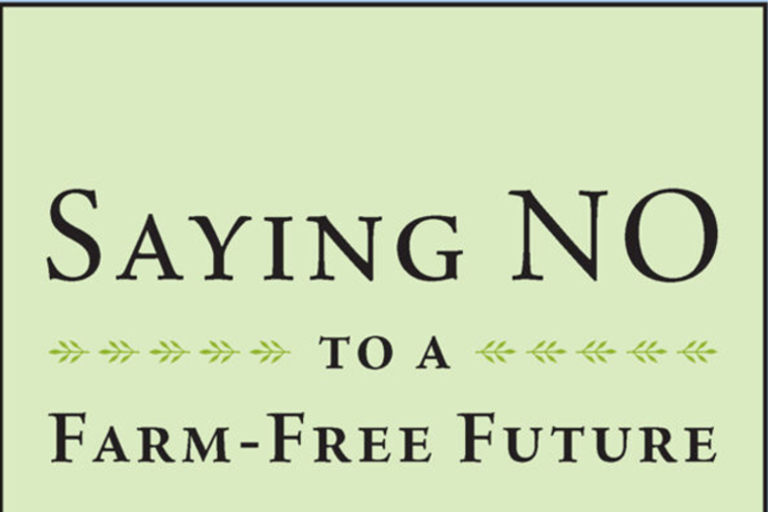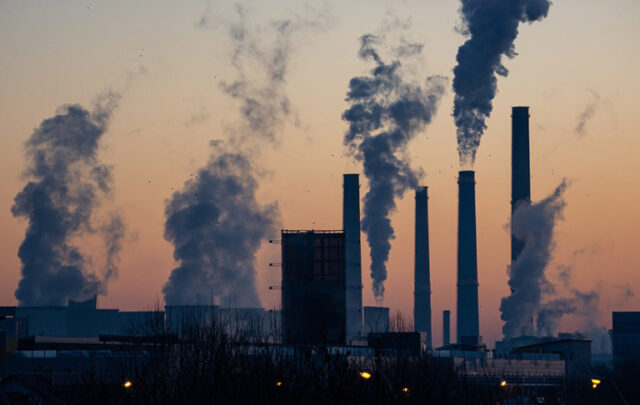The time has come to announce my new book, Saying NO to a Farm-Free Future: The Case for an Ecological Food System and Against Manufactured Foods. It’ll be published in the UK on 29 June and the US on 20 July, with ebook and audio versions also available. So there’s no excuse… I’m delighted that Sarah Langford, the author of Rooted, is writing a foreword for it.
The folks at Chelsea Green have come up with this attractive but unfancy cover, which matches my feelings about the book.

I wrote the book in a two-month blur as a job of work that I felt somebody had to do to combat the head of steam building around the case for a farm-free future associated with George Monbiot’s book Regenesis and the Reboot Food initiative. And if that somebody was me, so be it.
My original motivation was mainly just to critique the fanciful ecomodernism of Reboot Food, which I believe is apt to bedazzle people of goodwill but with limited knowledge of food and farming into thinking that a technological solution is at hand that will enable them to continue living high-energy, urban consumerist lifestyles while going easy on the climate and the natural world. Really, it isn’t. The danger is that farm-free bromides will, as usual with ecomodernism, instil a ‘great, they’ve fixed it!’ complacency at just the time when we need to jettison the techno-fix mentality and radically reimagine our social and political assumptions.
So the book takes a somewhat polemical approach in critiquing the arguments for manufactured food. But actually I found that this provided a pretty good foil for making an alternative case for agrarian localism, what I call in my book ‘a predominantly distributed rural population, energy restraint, diverse mixed farming for local needs, wildlands, human-centred science, popular smallholder democracy and keystone ecology’. So the book has that more positive framing too, much of which will be familiar to regular readers of this blog or of my previous book, although I like to think I’ve pushed a few things forwards. Still, it’s a short book, so a more detailed exposition awaits.
What I don’t and won’t do is offer some alternative technical or social one-size-fits-all solution. Solutionism of this kind is itself part of the problem. I daresay that will lead to some incomprehension in the book’s reception along the lines that if I can’t provide an alternative ‘answer’, then I can’t have anything worthwhile to say. Naturally, I don’t subscribe to that line of reasoning. Researchers, opinion-mongers and writers of books just don’t have ‘the answer’, whereas you – whoever ‘you’ are – probably do have part of an answer locally. But you have to work at it. Maybe my book will help. In that sense, what I offer is a bit like the answer of farming itself. Instead of the magic beans and golden geese of the Reboot Food narrative, all I can realistically offer is a bare seedbed awaiting productive work. The scene then has to be peopled by others, ordinary working people, doing the work.
Or maybe you could think of the book as an exercise in rewilding, because the nature of wildness is that you can’t really tell what’s going to happen next.
Anyway, I’ll be interested to see what kind of reception the book gets. Possibly, it’s presumptuous of me to expect it’ll get much of a reception at all, but my tweet from a few days back announcing the book has had around 34,000 views – so by my humble standards I think there may be an appetite out there for this.
I’m not going to steal my own thunder from the book pre-publication, but I thought I’d offer loyal readers of this blog a few tidbits by way of a sneak preview.
So, after some introductory material the book asks whether the energetics and economic geography implied in the manufactured food narrative are feasible (as I just said, I can’t give too much away just now about the book’s contents, but I’ll offer a clue: the answer is a two-letter word beginning with ‘n’). Then I consider whether the case against the wildlife and climate impacts of familiar plant-and-livestock based agriculture articulated in manufactured food narratives is plausible (answer: it’s complicated – let’s call it a two-letter word beginning with ‘n’ again, but with a side of three-letter word beginning with ‘y’). Next, I move on to examine whether a farm-free future for humanity is likely to involve what ecomodernist pioneer Stewart Brand called ‘urban promise’ – urbanization as a positive and prosperity-enriching experience. On that one, we’re back to a straightforward answer – the two-letter ‘n’ word again. Or at least we are if we have any commitment to justice. Finally, I make an alternative case for agrarian localism as the best means of securing human and natural wellbeing and climate stability, involving long-term human relationships with the land that, like all long-term relationships, require regular and ongoing work.
So there you have it. If you’d like to read the full version (or alternatively hear me reading it) I’d suggest pre-ordering a copy now! But I daresay I’ll write more about its themes on this blog once the book is out, albeit most likely with a bit less expounding than I devoted to my previous one.






